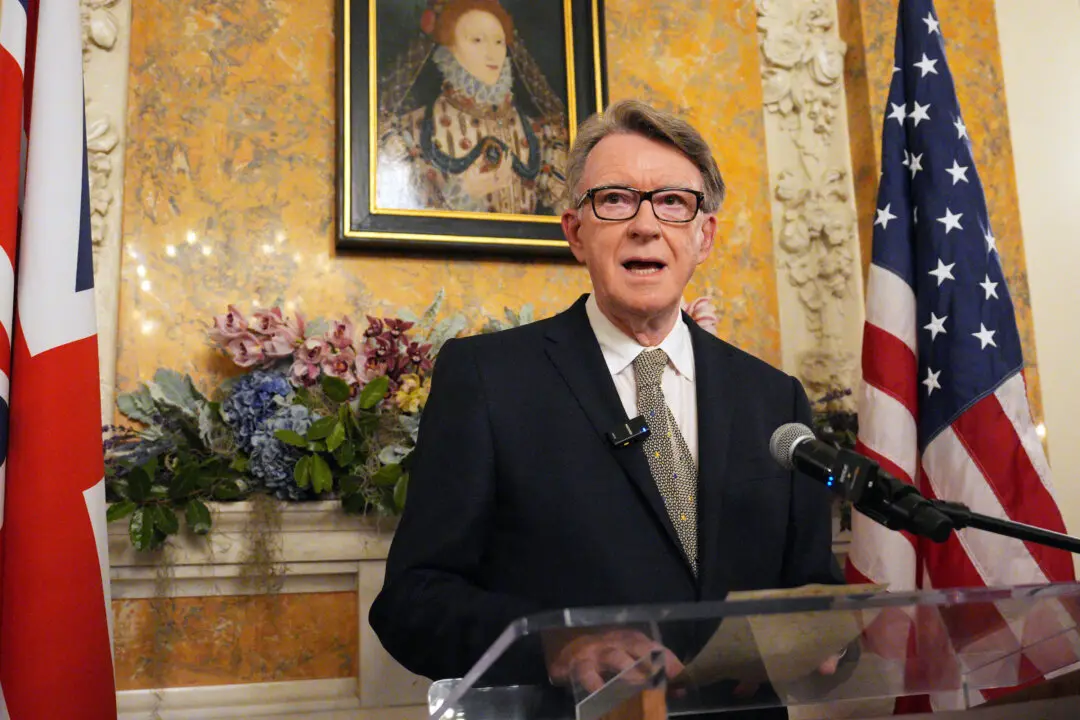Labour leader Sir Keir Starmer today launched the party’s full general election manifesto in Manchester, telling a heckler they had “given up on being a party of protest. We want to be a party of power.”
After the climate change activist was removed, Sir Keir acknowledged that there was no “rabbit out of the hat” in the manifesto—which contained no new policy announcements—as he pointed instead to his commitment not to raise income tax or VAT.
Sir Keir said he aimed to “turn the page decisively” on what he called 14 years of “Conservative chaos” as he set out Labour’s stall.
With the 136-page manifesto, Sir Keir claimed: “This is a serious plan, carefully thought through. I’m running as a candidate to be Prime Minister, not a candidate to run the circus.”
The general election will take place on July 4.
Emphasising the manifesto’s focus on economic growth, he pledged there would be no return to austerity and said there would be an immediate “cash injection” into public services to cut NHS waiting lists and hire more teachers, which he said would come from abolishing non-dom status and cracking down on tax avoidance.
Labour plans to raise more than £7 billion in revenue from other forms of tax, its costings document confirms, with further money to be raised through VAT on private school fees and closing “loopholes” in the windfall tax on oil and gas companies.
Gender Recognition Process ‘Simplified’
Sir Keir’s speech did not reference one of the more controversial pledges in the manifesto to “simplify” the process of obtaining a gender recognition certificate.In a policy likely to alienate many traditional Labour voters who do not accept the concept of gender ideology, the manifesto says: “We will modernise, simplify, and reform the intrusive and outdated gender recognition law to a new process. We will remove indignities for trans people who deserve recognition and acceptance; whilst retaining the need for a diagnosis of gender dysphoria from a specialist doctor, enabling access to the healthcare pathway.”
It adds, “Labour is proud of our Equality Act and the rights and protections it affords women; we will continue to support the implementation of its single-sex exceptions.”
And in a pledge which swiftly drew criticism from campaigners concerned about protecting children from harmful gender ideology, the manifesto said Labour will ban so-called “conversion therapy,” claiming that it is “abuse.”
The document states: “Labour will finally deliver a full trans-inclusive ban on conversion practices, while protecting the freedom for people to explore their sexual orientation and gender identity.”
The manifesto pledges that Labour will introduce a “landmark” Race Equality Act, which it claims will “enshrine in law the full right to equal pay for black, Asian, and other ethnic minority people, strengthen protections against dual discrimination and root out other racial inequalities.”
The party also pledges to “reverse the Conservatives’ decision to downgrade the monitoring of antisemitic and Islamophobic hate.”
In his speech, Sir Keir said the party will be “the party of business as well as the party of the workers,” with a pledge to keep corporation tax at its current rate of 25 percent.
Rwanda Scheme Scrapped But Border Security Pledged
To tackle soaring rates of illegal immigration, the party has pledged to scrap the Rwanda scheme and use the savings to set up the Border Security Command, which it said would improve counter-terror powers and crack down on people smugglers.Alongside this, a new returns enforcement unit, with 1,000 additional staff, will be established to fast-track the removal of illegal immigrants, who do not have the right to be in the UK, to safe countries.
On health, the party proposes to shift the NHS “away from a model geared towards late diagnosis and treatment, to one where more services are delivered in local communities,” and the creation of evening and weekend appointments to reduce waiting times.
There are no pledges around not locking down or having vaccine mandates in the future and nor is there any mention of reforming the vaccine damage payment scheme.
The manifesto pledges to “accelerate the push for Net Zero” through “decarbonising” industry. It also promises to create a state-owned “clean” power company, which it claims will cut bills and boost security, funded by a windfall tax on oil and gas companies.
An investment of £6.6 million is pledged for energy policies including grants and low-interest loans for homeowners through the “Warm Homes Plan” to invest in insulation and make improvements such as solar panels, batteries and low-carbon heating.
On transport, the manifesto pledges to tackle the soaring cost of car insurance and fix one million potholes every year, with an overhaul of the railways also promised.
Education proposals include plans to recruit 6,500 new teachers and create 3,000 new primary school-based nurseries, with a pledge to have free breakfast clubs in every primary school.
The manifesto pledges, “to restore law and order to our streets” through a neighbourhood policing guarantee, which will bring back patrols to town centres and recruit thousands of new police officers, support officers and special constables.
There is also a pledge to tackle knife crime by banning the online sale of various blades and other weapons, including so-called “zombie” swords, and a strategy designed to prevent young people turning to gang culture. The manifesto pledges to create a new offence around the “exploitation” of children by those who recruit them for criminal activity.
Two-State Solution
On foreign affairs, Sir Keir said in the forward to the manifesto, “The world has become increasingly volatile, with a major war in Europe for the first time in a generation and ever greater threats to the living standards of working people.”The document outlines support for a two-state solution in the Middle East, saying: “Palestinian statehood is the inalienable right of the Palestinian people. It is not in the gift of any neighbour and is also essential to the long-term security of Israel.”
It adds that “With Labour, the UK’s military, financial, diplomatic and political support for Ukraine will remain steadfast.”
The Labour leader, who took over from Jeremy Corbyn following the heavy defeat suffered by the party at the hands of Boris Johnson in 2019, said, “The defining purpose of my Labour leadership has been to drag my party away from the dead end of gesture politics and return it once more to the service of working people.”
The opinion polls show Labour is currently on course to win a landslide victory. The party has come to power just three times in history, under Clement Atlee in 1945, Harold Wilson in 1964 and Sir Tony Blair in 1997.







